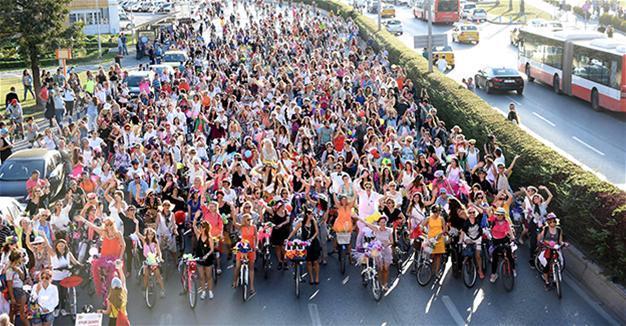Turkey’s female bikers demonstrate with powder and paint - and shorts
Nazlan Ertan - İZMİR

DHA photo
Thousands of female bikers from 28 cities in Turkey and Turkish Cyprus got behind the handle bars on Sept. 24 for the annual Chic Women’s Bicycle Tour in a peaceful demonstration that combined feminism and green transport.
The bike tour, initiated by İzmir-based history teacher and latecomer to cycling Sema Gür four years ago, was a modest attempt to create awareness and encouragement for women who want to bike. But quickly the event has evolved into a rights platform, where women put on their most colorful costumes, decorate their bikes and push the pedals for more rights and less harassment, both on the road and in life.
At this year’s Chic Women’s Bicycle Tour, which took place in 28 cities including Istanbul, İzmir, the Marmara province of Bursa and the Central Anatolian province of Çorum, there were a number of participants who wore shorts – a reference to Ayşegül Terzi, a nurse who was recently attacked by a man in Istanbul for wearing shorts while riding on public transportation.
The event was also linked on social media to a fatwa by Iran’s Ali Khamenei that bans women from cycling in public, even if met the Islamic republic’s clothing rules. “Look how Turks can cycle easily, while Iranian women cannot. Thank you [Mustafa Kemal] Atatürk!” said a tweet about the event.
“We have the Chic Women Bicycle Tour because we are women and we want to be visible,” said Gür at the beginning of the tour that started in İzmir’s Konak district and ended at the city’s Republic Square. At the end of the ride the women parked their bicycles in the shape of a heart and danced to the sound of the 1970’s Turkish pop hit “Hayat Bayram Olsa” (If Only Life was a Feast).
“A society can only breathe through the visibility of their women – when they are on the road or anywhere in their daily life, without any fear. A bicycle is a sign of liberty. We are here as free individuals and we demand respect for everybody’s individual liberties,” she said. The crowds cheered as she delivered the punchline: “We want respect for bicycles, for female bikers. We demand respect for women.”
This clear message was carefully crafted after much deliberation in the wake of recent abuses against women.
“I am under a lot of pressure to make this bicycle tour a protest movement for Terzi and urge everyone to come in shorts,” Gür told the Daily News a few days before the tour. “This is not a single-issue demonstration – the tour is a platform whose only condition is that women who want to participate dress up and decorate their bikes. Those who want to come with shorts are welcome, as well as those who want to come with headscarves. This is open to all women - in shorts, headscarved, LGBTI and all.”
From mobility to liberty
“In the beginning, it was simply an attempt to make cycling more women-friendly,” Gür said. “I started cycling as I approached my 40s and saw immediately that it was not a sport that accommodated women. Everything was very masculine - the routes chosen, the lycra clothes, the soberness of bikes… So I decided that I would wear skirts, put flowers on my bike and create a movement that encourages women to cycle on their terms, with their idea of aesthetics. I put forward the idea of having a Chic Women’s Bicycle Tour on Facebook, not sure whether it would take off. I wanted it to be a festival that is part of the World Clean Mobility Week celebrations every year.”
“I guess we did get the wheels moving,” Gür added. “We have started a relationship of cooperation with the İzmir Municipality and they have set up a Bicycle Desk, whose members take up our complaints. It is a good beginning but more needs to be done. When I bike on the sea front to the city center, I stop at least a dozen times. The construction in the city has completely paralyzed the bike route and we have not been offered an alternative.”
More actors, but still less bikes
In recent years, several women’s bicycling initiatives have been founded. The Istanbul-based Women Bicyclists’ Initiative, which was established in 2015, just published a bicycling guide for women – a small booklet that helps them get a start in biking, explaining traffic rules, fun ways to integrate biking into daily life and stories of women who bike.
Despite the small- and medium-scale movements, however, biking is still rare in Turkey and rarer still among women. Only 17 percent of the population uses a bike – a number that falls to 5 percent when you look at the female population. Only six in 1,000 women in Istanbul, Turkey’s largest and arguably most modern city, use a bicycle in their daily lives. This is not related to religion. Unlike in Iran, there is not a “religion link.”
Asked about this, Turkey’s religious authorities say that bikes are admissible for both men and women, provided they behave in a manner that does not conflict with customs, such as dressing provocatively.
However, 65 percent of women would like to ride a bike. This is precisely Gür’s target group. “Buy that bike, borrow it, take it out of that storage whatever and decorate it. Own it by making it beautiful. Come out with us with colorful hats and headbands and flowers in your hair. Be visible and fearless,” said Gür. And the women in İzmir, Istanbul and many other cities just did that.
